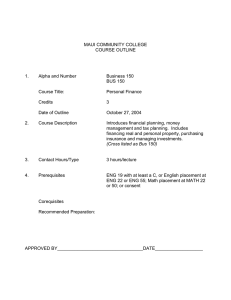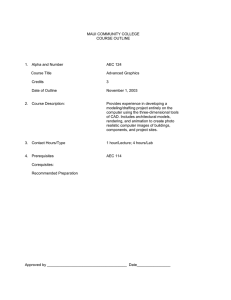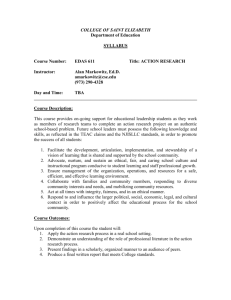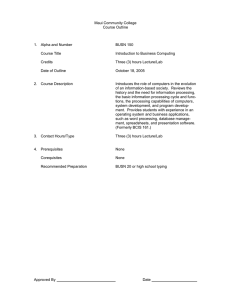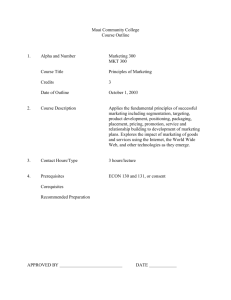2003.30 - MGT 300, CO (addition)
advertisement
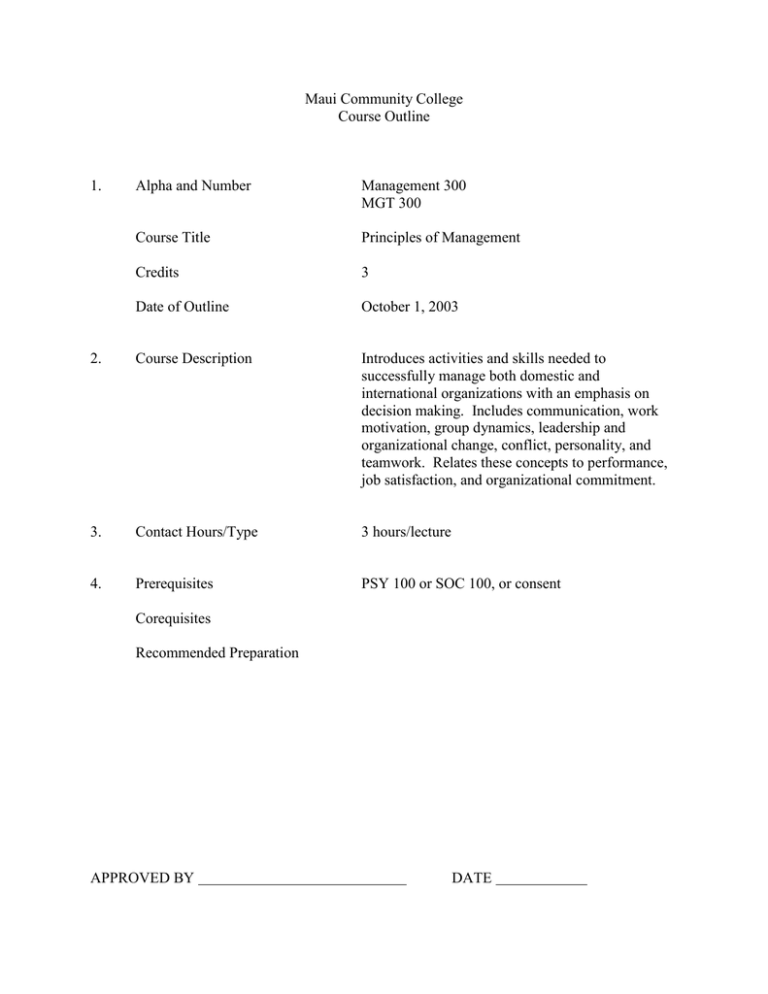
Maui Community College Course Outline 1. Alpha and Number Management 300 MGT 300 Course Title Principles of Management Credits 3 Date of Outline October 1, 2003 2. Course Description Introduces activities and skills needed to successfully manage both domestic and international organizations with an emphasis on decision making. Includes communication, work motivation, group dynamics, leadership and organizational change, conflict, personality, and teamwork. Relates these concepts to performance, job satisfaction, and organizational commitment. 3. Contact Hours/Type 3 hours/lecture 4. Prerequisites PSY 100 or SOC 100, or consent Corequisites Recommended Preparation APPROVED BY DATE 2 5. General Course Objectives This course presents organizational behavior, leadership, and management concepts with emphasis on individual and organizational behavioral requirements. Helps the student manage his/her behavior in the context of required organizational behavior. 6. Student Learning Outcomes For assessment purposes, these are linked to # 7 – Recommended Course Content On successful completion of this course, students will be able to a. b. c. d. e. f. g. h. i. j. k. l. m. n. o. p. q. r. s. t. u. v. w. x. y. z. identify a manager and explain his/her role in the domestic and international business environments; assess and quantify the ethical culture of an organization; identify and define problems within an organization; explain the cause of a problem and recommend alternative solutions; develop a strategic plan for an organization, including an outline, and identify the planning tool that should be used; explain SWOT analysis and how it fits into the strategic plan for an organization develop a vision and mission statement; draw various organizational charts for a businesses and explain their strengths and weaknesses; demonstrate how a company might install a network-based organization; explain lines of authority, departmentalization, job specialization, delegation and decentralization, coordination, and span of control; explain reasons for change within an organization, how to implement the change, and be able to identify what went wrong during the implementation of the change list the various methods of managing personal conflict and ethical issues; write a job description; prepare a recruiting plan and demonstrate how to recruit needed employees; explain correct and incorrect ways to interview, train, and discipline employees; identify leadership styles and explain the traits and skills required to be an effective leader; develop a behavior management program for a particular job; define motivation and identify ways to increase motivation among workers; identify communication barriers that can be found in an organization; list and explain what managers can do to improve interpersonal communications; analyze a team situation, including the level of employee involvement in a team, and list reasons why the team is performing effectively or not; conduct a productive group decision-making meeting; identify the key elements necessary for effective control; list specific feed forward, concurrent, and feedback controls a manager can use to control an activity; explain the traits needed to become an entrepreneur; conduct an informal business feasibility study and recommend a startup structure for a domestic or international business; 3 aa. bb. 7. 8. list and explain the socio cultural, legal/political, and ethical errors managers make when expanding abroad; and specify the basic global strategy and organizational structure a manager should pursue when expanding abroad and the advantages and disadvantages of each. Recommended Course Content and Approximate Time Spent on Each Topic Linked to # 6 – Student Learning Outcomes 1-2 Weeks: Managing in a Cultural and Ethical Environment (a, b) 1-2 Weeks: Decision Making (c, d) 1-2 Weeks: Planning Process and Strategic Management (e, f, g) 1-2 Weeks: Organizing and Organizational Structures (h, i, j) 1-2 Weeks: Managing Organizational Change (k, l) 1-2 Weeks Staffing and Human Resource Management (m, n, o) 1-2 Weeks: Leadership and Communication (k, l, o, p, s, t) 1-2 Weeks: Individual Behavior and Motivation (p, q, r) 1-2 Weeks: Managing Groups and Teams (l, u, v) 1-2 Weeks: Control and Commitment (w, x) 1-2 Weeks: Managing Entrepreneurial Organizations (y, z) 1-2 Weeks: Managing in a Global Environment (p, t, aa, bb) 0-2 Weeks Special Topics (a – bb) Text and Materials, Reference Materials, Auxiliary Materials and Content Appropriate text(s) and materials will be chosen at the time the course is offered from those currently available in the field. Examples include Text(s): Organizational Behavior, Kreitner & Kinicki, 5th edition, 2001, Mc Graw Hill. Managemen, Gary Dessler, 3rd Ed., 2004, Prentice Hall. 4 Material: Text(s) may be supplemented with: Accompanying practice set if available Articles and/or handouts prepared by the instructor Magazine or newspaper articles Other Appropriate films, videos or internet sites Television programs Guest speakers Other instructional aids 9. Recommended Course Requirements and Evaluation Specific course requirements are at the discretion of the instructor at the time the course is being offered. Suggested requirements might include, but are not limited to Examinations (written and/or oral) In-class exercises Homework Quizzes Projects/research Attendance and/or class participation 10. 40-80% 0-30% 0-30% 0-30% 0-40% 0-20% Methods of Instruction Instructional methods vary considerable with instructors and specific instructional methods will be at the discretion of the instructor teaching the course. Suggested techniques might include, but are not limited to a. b. c. d. e. f. g. h. i. j. Quizzes and other tests with feedback and discussion; Lectures and class discussions; Problem solving; PowerPoint presentations; Videos, DVDs, CD-ROMs; Guest speakers; Group activities; Oral reports and other student presentations; Games and simulations; Homework assignments such as - Reading, or watching, and writing summaries and reactions to accounting issues in the media including newspapers, video, magazines, journals; - Lectures, web-based material, and other sources; 5 k. l. m. n. o. - Annual report activities; - Reading text and reference material and answering discussion questions; - Research environmental issues, and problems; Web-based assignments and activities; Reflective journals; Group and/ or individual research projects with reports or poster presentations; Study logs and study groups; Service-Learning, community service, and/or civic engagement projects and other contemporary learning techniques (such as problem-based learning).
